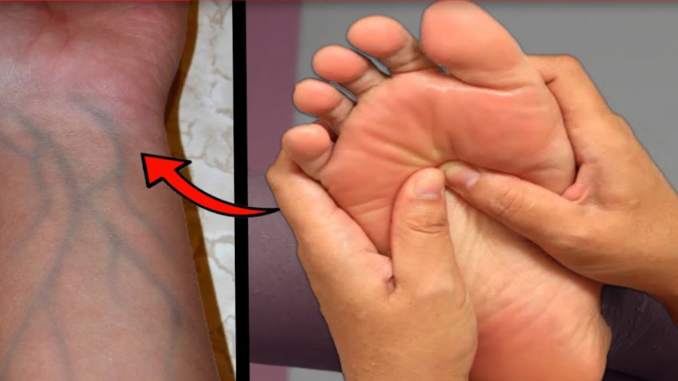Quickly! Watch Before It’s Deleted! Download Hot 3:00 Minutes $3x V!de0s Here | Watch 2:00 H0t $3x V!d0es Now!
Many of us have had the experience of coming to enjoy an activity as adults. For example, we weren’t tennis players, bird lovers, plant parents, or photographers early in life, but came to enjoy one of those things.
Self-discipline can have a similar trajectory. It might have been something we didn’t appreciate, didn’t value, didn’t enjoy, or weren’t good at. But that can change.
Just like someone can develop a love for a hobby they had little prior interest in, you can develop a love for self-discipline. You don’t need to have had an early affinity for it to enjoy it and be good at it now. It can be picked up at any age.
Here are five ways.
1. Let Success at Self-Discipline Fan Out
There’s an extent to which self-disciplined routines naturally propagate other self-disciplined routines. There are two ways this happens. The first is because small successes spur us on. For example, we succeed at a new habit of preparing gourmet bento box lunches for ourselves, and we want to try other healthy, aesthetic, or efficient habits.
The second mechanism is that one self-disciplined routine can provide structure for others. Your lunch prep habit might lead to better grocery shopping habits. Your desire to play tennis before it gets hot each Saturday might lead to better Friday night habits.
Of all the points here, success at self-discipline is the one that will most powerfully cause you to like it more and spur further interest in new ways to be self-disciplined.
Quickly! Watch Before It’s Deleted! Download Hot 3:00 Minutes $3x V!de0s Here | Watch 2:00 H0t $3x V!d0es Now!
2. Link Self-Discipline to Something You Value Highly
You don’t have to care about self-discipline for its own sake. You don’t have to be attracted to stoicism. Instead, tightly link self-discipline to what you inherently value most.
The key is seeing how self-discipline facilitates what’s most important to you.
For example, you might notice:
Self-discipline helps me be more efficient.
Self-discipline helps me be calmer.
Self-discipline helps me be more creative.
Self-discipline helps me worry less.
Self-discipline helps me feel safer.
Self-discipline helps me have stronger bonds with the people I love.
The examples are only to illustrate the point. Pick what matters most to you, then outline how self-discipline facilitates that important thing.
You can focus on how it increases positives or reduces negatives. For example, you might focus on how self-discipline leads to you being a better parent by rushing your children less, giving them more consistent cuddles, or reading to them more. Or you might focus on how it reduces wasted time or money, or helps relieve your anxiety about your finances.
3. Disconnect Your Version of Self-Discipline From Your Stereotypes
What image of a self-disciplined person comes to mind? Up at 4:30 a.m., chugs supplements, optimizes the heck out of everything, and listens to self-improvement podcasts on their commute?
Or maybe your stereotype of the self-disciplined person is the person who always responds to texts within five minutes, rigorously keeps up with their hair-coloring schedule, has a spotless car, and wears color-coordinated fitness attire.
You don’t need to seek to fit a stereotype of a self-disciplined person. You need to become the version of a self-disciplined person who helps you achieve the outcomes you value.
4. Invest Equally in the Self-Discipline of Less and the Self-Discipline of More
The self-discipline of less means easing up in moments when pushing harder would leave you too drained for what else you have planned.
Ask yourself this question: When you could push harder, do you always or nearly always choose that option? Do you squeeze out one extra rep at the gym? Do you read one more book to your toddler even when you’re tired? Do you proofread that email one extra time before sending it out when it’s probably fine?
If you’re someone who tends to push yourself to do more in most situations, you need to practice the self-discipline of less as much as the self-discipline of more. Learn to identify when you should go easy, then stick to that plan rather than giving in to the temptation to push yourself. Learning when to ease up helps you sustain self-discipline in the long term, making you more likely to enjoy it rather than see it as punitive.
Quickly! Watch Before It’s Deleted! Download Hot 3:00 Minutes $3x V!de0s Here | Watch 2:00 H0t $3x V!d0es Now!
5. Treat Self-Discipline Like a Type of Fitness That You Can Build
Self-discipline is like fitness. You can start out of shape and build your fitness gradually.
Your first attempts at self-discipline will feel awkward, clunky, and not aesthetic or slick.
Consider how different a fitness beginner looks compared to a fitness influencer. The beginner is sweaty, awkward, and huffing. The influencer seems perfect and effortless in comparison. That’s the difference between starting and mastering something.
The same applies to self-discipline. A beginner at self-discipline will look clunky compared to someone who has a lifelong love of routines and organization. Expect this awkward phase. Don’t let it discourage you from continuing to build the skill.
An important concept we can borrow from fitness is durability. In endurance exercise, the term durability means how much of your power you can still put out when you’re tired. Building self-discipline requires building your durability, too. Practicing self-discipline when you’re tired (when you’ve already put out a lot of work) is an important part of building that fitness. Building durability helps you trust your ability to maintain self-discipline even when it’s hard.
Self-Discipline Can Feel Like a Newly Discovered Hobby
You might not think of yourself as a self-disciplined person. You might associate self-discipline with pressure, obligation, or stereotypes you don’t relate to. However, just like a new hobby you discover, you can develop a taste for self-discipline that you didn’t have before.
This happens when you build on your early successes, connect self-discipline to outcomes you value, create your own version without conforming to stereotypes, and build gradually from awkward beginnings. Even if you’ve never been organized or methodical in your life, self-discipline could be the adult hobby you discover you enjoy and are good at.
Quickly! Watch Before It’s Deleted! Download Hot 3:00 Minutes $3x V!de0s Here | Watch 2:00 H0t $3x V!d0es Now!

 Entertainment4 months ago
Entertainment4 months ago
 Politics4 months ago
Politics4 months ago
 Breaking News5 months ago
Breaking News5 months ago
 Breaking News5 months ago
Breaking News5 months ago
 Breaking News6 months ago
Breaking News6 months ago
 Breaking News6 months ago
Breaking News6 months ago
 Breaking News6 months ago
Breaking News6 months ago
 Breaking News6 months ago
Breaking News6 months ago


